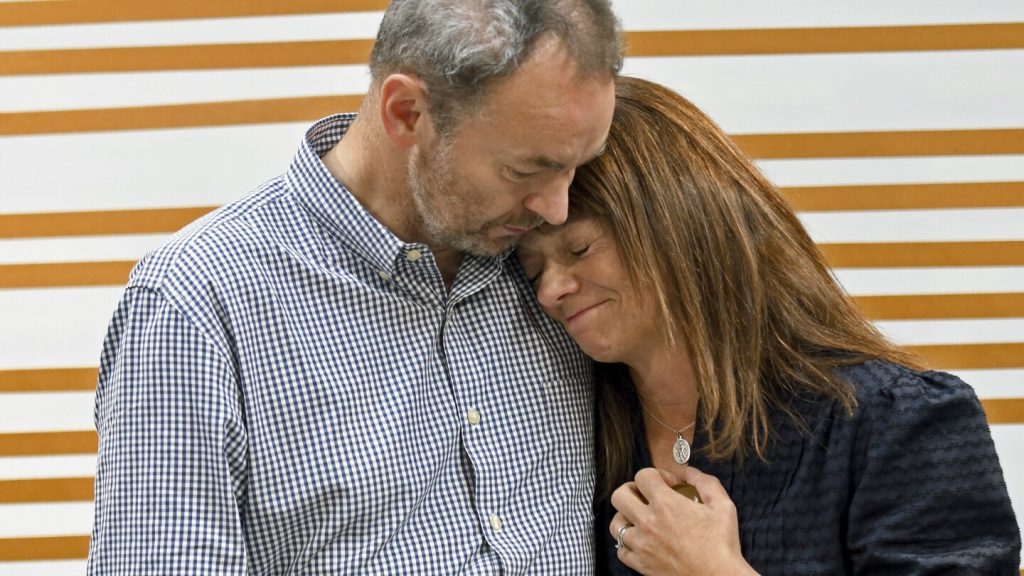In a trial that has garnered national attention, prosecutors are urging jurors to convict a former Colorado sheriff’s deputy, Andrew Buen, of murder and other charges for the shooting and killing of 22-year-old Christian Glass in 2022. The incident, which took place in a small mountain community, has sparked calls for police reforms focusing on crisis intervention. A second officer involved in Glass’ death has already pleaded guilty to a misdemeanor, while six others have been charged with failing to intervene. In the closing arguments of Buen’s trial, his defense argued that he shot Glass to protect a fellow officer, making the shooting legally justified. Glass had called 911 for help after becoming stuck on a dirt road in Silver Plume, exhibiting signs of paranoia, hallucination, and mental health crisis.
Upon the arrival of Buen and other officers, Glass refused to exit his vehicle and exhibited erratic behavior, making heart shapes with his hands and praying. Prosecutors allege that Buen, a former Clear Creek County Sheriff’s Deputy, needlessly escalated the situation by repeatedly shouting commands at Glass, who did not have any legal obligation to exit the vehicle. Despite attempts with bean bag rounds and Tasers, Glass eventually flung a knife out of a broken window towards another officer, prompting Buen to fire five times, resulting in Glass’ death. District Attorney Heidi McCollum argued that Glass was reacting to being treated poorly by the officers, and the knife never posed a direct threat to the officers.
Defense attorney Carrie Slinkard faulted prosecutors for not considering Glass’ underlying behavioral or psychological issues, potential drug involvement, or a combination of both, to explain his behavior during the encounter with officers. Buen is facing charges of second-degree murder, official misconduct, and reckless endangerment, with Glass’ mother emphasizing that her son was experiencing a mental health episode at the time. Chief Deputy District Attorney Stephen Potts described Glass as a “terrified boy” and questioned whether individuals in crisis should be treated in such a manner. Glass’ parents had previously won a $19 million settlement that included policy changes such as crisis intervention training for Colorado law enforcement officers responding to individuals in distress.
The trial of Andrew Buen has highlighted the complexities of law enforcement response to individuals experiencing mental health crises and has reignited discussions about police reforms and the need for crisis intervention training. The case of Christian Glass, a 22-year-old man shot and killed by Buen in 2022, has drawn national attention and prompted calls for accountability in law enforcement actions. Prosecutors are pushing for a conviction, alleging that Buen needlessly escalated a standoff with Glass, who was in distress and exhibiting signs of paranoia and mental health crisis. The defense argues that Buen acted to protect a fellow officer, justifying the shooting as legally justified. However, the prosecution maintains that Buen did not have the legal justification to use lethal force against Glass.
The encounter between Buen and Glass took a tragic turn as Glass, who had refused to exit his vehicle, eventually flung a knife out of a broken window towards another officer before being shot by Buen. District Attorney Heidi McCollum suggested that Glass was reacting to being treated poorly by the officers and that the knife never posed a direct threat to them. On the other hand, Buen’s defense attorney, Carrie Slinkard, criticized prosecutors for not considering Glass’ underlying behavioral or psychological issues, potential drug involvement, or a combination of both. Buen is facing charges including second-degree murder, official misconduct, and reckless endangerment in connection with Glass’ death. The case has raised questions about the appropriate response to individuals in crisis and the need for better training for law enforcement officers.
The tragic death of Christian Glass has underscored the need for improved crisis intervention strategies within law enforcement and sparked conversations about police reform. As the trial of Andrew Buen unfolds, the prosecution and defense present contrasting arguments about the events that led to Glass’ death, highlighting the complexities of responding to individuals experiencing mental health crises. Buen’s defense maintains that he acted to protect a fellow officer, while prosecutors argue that his actions were unnecessary and unjustified. The outcome of the trial will not only determine Buen’s fate but also have broader implications for how law enforcement agencies handle similar situations in the future. As the jurors deliberate, the case of Christian Glass serves as a stark reminder of the importance of addressing mental health issues in policing and the need for accountability in law enforcement actions.


